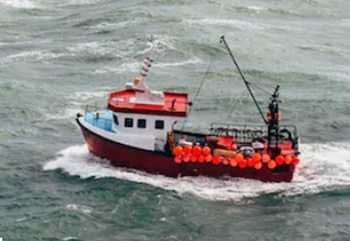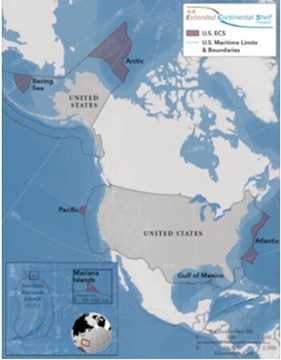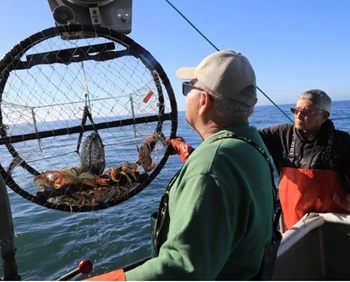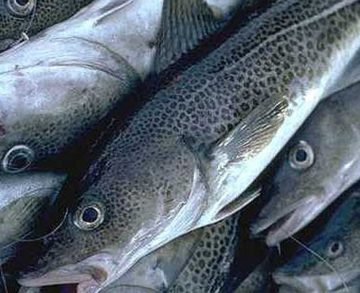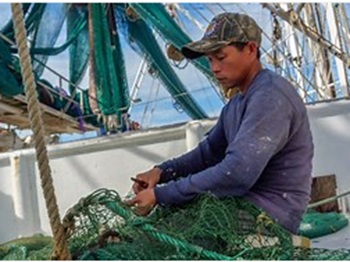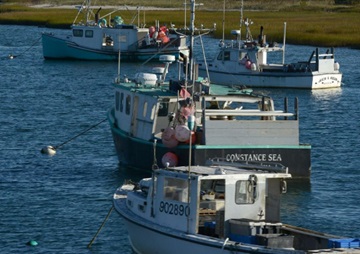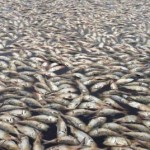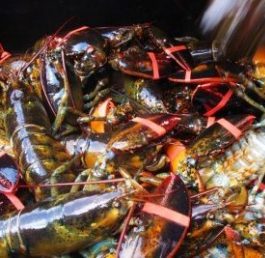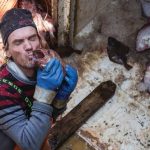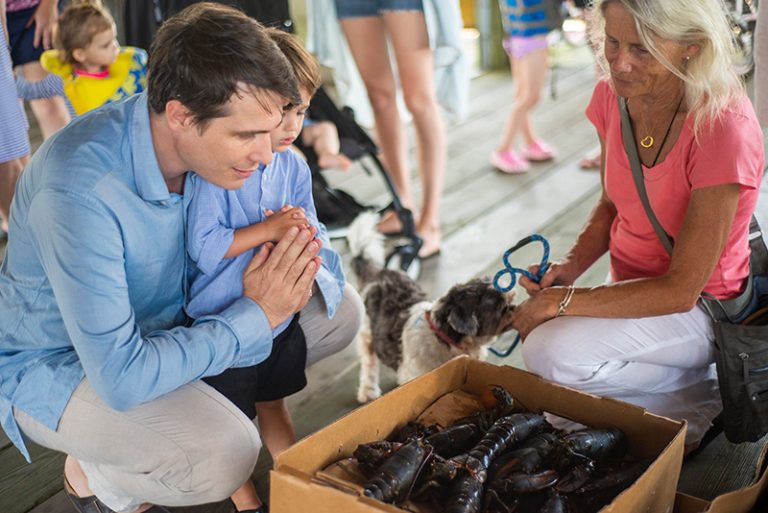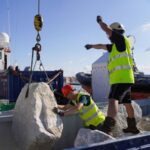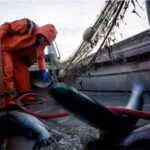Tag Archives: NOAA
A treasured industry and an endangered species compete for survival
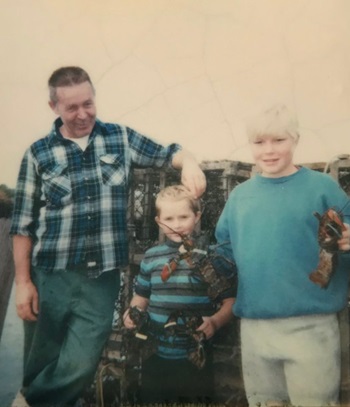 On a cold morning in January, Chris Welch is already out preparing his boat. This time of year, his days begin before sunrise. It’s a ritual he’s grown accustomed to — at just 35 years old, he’s already spent decades working in the lobster business. “I started lobstering when I was six.” Welch said. Being a lobsterman in Maine is less of a job and more of a lifestyle. It’s a family business for many, including Welch, whose learned the ropes from his grandfather. But recently, the focus is less on what lobstermen’s ropes are pulling up and more on what may be running into them. Video, more, >>click to read<< 10:23
On a cold morning in January, Chris Welch is already out preparing his boat. This time of year, his days begin before sunrise. It’s a ritual he’s grown accustomed to — at just 35 years old, he’s already spent decades working in the lobster business. “I started lobstering when I was six.” Welch said. Being a lobsterman in Maine is less of a job and more of a lifestyle. It’s a family business for many, including Welch, whose learned the ropes from his grandfather. But recently, the focus is less on what lobstermen’s ropes are pulling up and more on what may be running into them. Video, more, >>click to read<< 10:23
Fishing advocates say California salmon disaster fund is too low
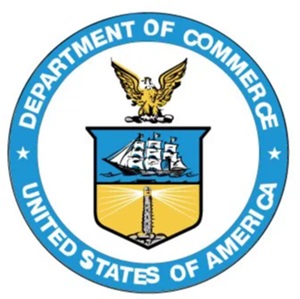 The $20.6 million allocated for federal relief for California’s Chinook salmon stocking is only two-thirds of the state’s aid request, and threatens the existence of fishing businesses, California commercial fishermen and rental recreational groups said, on Monday. In a letter to U.S. Commerce Department Secretary Gina Raimondo, the Pacific Coast Federation of Fishermen’s Association, the Golden Gate Fishermen’s Association and the Northern California Guides and Sportsmen’s Association called for “immediate full funding of salmon disaster funding assistance” at $30.7 million. Data sought by state officials. “The state’s economic analysis already falls short of expected needs, and the federal disaster aid package adds insult to injury,” fishing group leaders wrote in their joint letter. more, >>click to read<< 08:56
The $20.6 million allocated for federal relief for California’s Chinook salmon stocking is only two-thirds of the state’s aid request, and threatens the existence of fishing businesses, California commercial fishermen and rental recreational groups said, on Monday. In a letter to U.S. Commerce Department Secretary Gina Raimondo, the Pacific Coast Federation of Fishermen’s Association, the Golden Gate Fishermen’s Association and the Northern California Guides and Sportsmen’s Association called for “immediate full funding of salmon disaster funding assistance” at $30.7 million. Data sought by state officials. “The state’s economic analysis already falls short of expected needs, and the federal disaster aid package adds insult to injury,” fishing group leaders wrote in their joint letter. more, >>click to read<< 08:56
Trade groups and state unhappy with federal NOAA Fisheries management plan plan in public comments
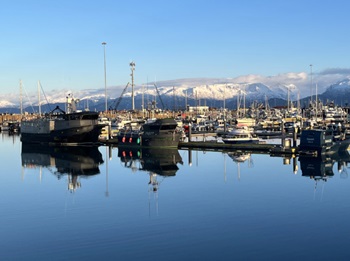 Public comment is in for a NOAA Fisheries management plan for Cook Inlet’s most productive drift fishing waters. In nearly 90 submitted public comments, cities, tribes, trade organizations and the state commissioner of Fish and Game express mixed and negative reactions to the plan. The Cook Inlet Exclusive Economic Zone, or EEZ, was the subject of a lawsuit by the United Cook Inlet Drift Association over management of the fishery, which starts three miles offshore and stretches from south 0 f Kalgin Island to Anchor Point. In response, the federal North Pacific Fishery Management Council closed the fishery in 2020, which was met with protest by Kenai Peninsula commercial fishermen. more, >>click to read<< 10:52
Public comment is in for a NOAA Fisheries management plan for Cook Inlet’s most productive drift fishing waters. In nearly 90 submitted public comments, cities, tribes, trade organizations and the state commissioner of Fish and Game express mixed and negative reactions to the plan. The Cook Inlet Exclusive Economic Zone, or EEZ, was the subject of a lawsuit by the United Cook Inlet Drift Association over management of the fishery, which starts three miles offshore and stretches from south 0 f Kalgin Island to Anchor Point. In response, the federal North Pacific Fishery Management Council closed the fishery in 2020, which was met with protest by Kenai Peninsula commercial fishermen. more, >>click to read<< 10:52
Pallone, Environmentalists Want Shipping Speeding Rules Enforced
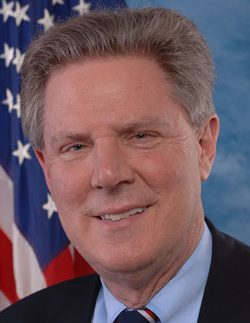 Is the sonar activity related to offshore wind farms leading to whale deaths? The debate rages on. The Long Branch-based environmental group Clean Ocean Action suspects a possible connection between a spate of at least nine whales being stranded on the beaches of New Jersey and New York in December 2022 and January 2023 and wind farm activity, with COA Executive Director Cindy Zipf saying a moratorium is necessary “until an investigation is completed into why whales and the dolphins have been dying and to make sure it’s nothing to do with the intense amount of offshore wind pre-construction activity. However, other environmental groups, such as the New Jersey League of Conservation Voters and the Sierra Club, which are supporters of the wind farms and government agencies such as the Bureau of Ocean Energy Management and the National Oceanic and Atmospheric Administration, say they have found no evidence of whale deaths being linked to offshore wind activity. more, >>click to read<< 14:23
Is the sonar activity related to offshore wind farms leading to whale deaths? The debate rages on. The Long Branch-based environmental group Clean Ocean Action suspects a possible connection between a spate of at least nine whales being stranded on the beaches of New Jersey and New York in December 2022 and January 2023 and wind farm activity, with COA Executive Director Cindy Zipf saying a moratorium is necessary “until an investigation is completed into why whales and the dolphins have been dying and to make sure it’s nothing to do with the intense amount of offshore wind pre-construction activity. However, other environmental groups, such as the New Jersey League of Conservation Voters and the Sierra Club, which are supporters of the wind farms and government agencies such as the Bureau of Ocean Energy Management and the National Oceanic and Atmospheric Administration, say they have found no evidence of whale deaths being linked to offshore wind activity. more, >>click to read<< 14:23
Maine Lobster Industry Faces off against Conservationists over Whale Protections
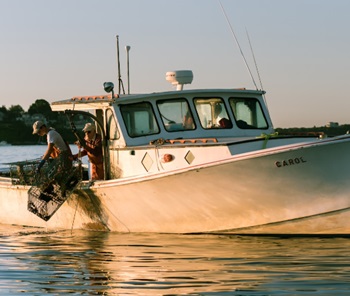 Maine lobster fishers recently won reprieve on new federal regulations to protect the endangered North Atlantic right whales. According to the Maine’s Lobstermen Association, The regulations could dramatically change lobster fishing practices, impacting fishers and Maine’s island communities who depend upon this resource. In 2023, a federal court ruled in favor of the Center and other groups, finding that NOAA had violated the Endangered Species Act and Marine Mammal Protection Act, and was not doing enough to reduce the lobster industry’s threat to right whales. But Maine’s community of lobster fishers are encouraged by the decision. “It gives us time to take a breath,” Steve Train, a commercial lobster fisher from Long Island, Maine, tells Food Tank. “Some people think it might be the end of it all, but I think most people see a little light now that we can work under.” “In the last 25 years, there has been one documented entanglement of a North Atlantic right whale in Maine fishing gear,” Train says. more, >>click to read<< 13:16
Maine lobster fishers recently won reprieve on new federal regulations to protect the endangered North Atlantic right whales. According to the Maine’s Lobstermen Association, The regulations could dramatically change lobster fishing practices, impacting fishers and Maine’s island communities who depend upon this resource. In 2023, a federal court ruled in favor of the Center and other groups, finding that NOAA had violated the Endangered Species Act and Marine Mammal Protection Act, and was not doing enough to reduce the lobster industry’s threat to right whales. But Maine’s community of lobster fishers are encouraged by the decision. “It gives us time to take a breath,” Steve Train, a commercial lobster fisher from Long Island, Maine, tells Food Tank. “Some people think it might be the end of it all, but I think most people see a little light now that we can work under.” “In the last 25 years, there has been one documented entanglement of a North Atlantic right whale in Maine fishing gear,” Train says. more, >>click to read<< 13:16
Frustrated fishermen get good news: good rockfishing, salmon fishing to return in 2024
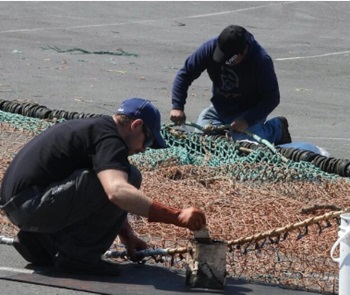 With an oversized head, bulbous eyes and narrow body, the quillback rockfish looks like a golden bullfrog armed with a quiver full of arrows on its back. Few sport fishermen want to keep, much less eat, the famously sharp and ouchy and skinny quillback, which are reeled by those seeking meatier rockfish. But it was the quillback, which is often tossed back into the sea, whose population plummet caused a shutdown that impacted the entire rockfish industry, both for commercial and for party boats operating out of Mendocino Coast’s Noyo Harbor. That mysterious plunge in quillback numbers cut off all near-shore rockfish fishing last year, causing an organized outcry by fishermen and a new plan for 2024. Photos, more, >>click to read<< 07:15
With an oversized head, bulbous eyes and narrow body, the quillback rockfish looks like a golden bullfrog armed with a quiver full of arrows on its back. Few sport fishermen want to keep, much less eat, the famously sharp and ouchy and skinny quillback, which are reeled by those seeking meatier rockfish. But it was the quillback, which is often tossed back into the sea, whose population plummet caused a shutdown that impacted the entire rockfish industry, both for commercial and for party boats operating out of Mendocino Coast’s Noyo Harbor. That mysterious plunge in quillback numbers cut off all near-shore rockfish fishing last year, causing an organized outcry by fishermen and a new plan for 2024. Photos, more, >>click to read<< 07:15
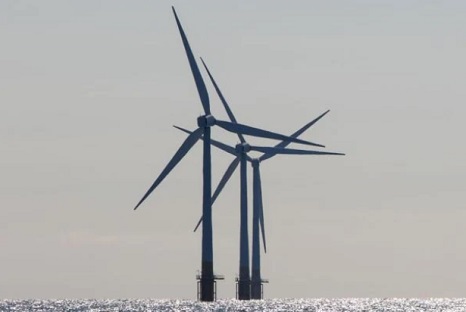
Commercial Fishers Say Biden Admin’s ‘Ocean Justice’ Initiative Totally Ignores Their Concerns
The Biden Administration announced the “ocean justice” strategy in December 2023 during the United Nations (UN) climate summit, known as COP28, in order “to advance environmental justice for communities that rely on the ocean and Great Lakes for economic, cultural, spiritual, recreational and food security purposes.” However, several stakeholders in the commercial fishing industry who depend on the fruits of America’s waters to make a living and are therefore interested in sustainable use of the oceans, say that the administration is overlooking their concerns about how the oceans are managed, especially with regard to the administration’s extensive efforts to fast track industrial scale offshore wind. more, >>click to read<< 10:19
US Wind Requests Authorization to Cover Possible Harm, Disturbance to Marine Mammals
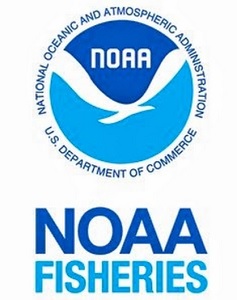 The National Oceanic and Atmospheric Administration (NOAA) Fisheries has announced a request from US Wind, Inc. for a Letter of Authorization that would cover potential negative impacts to small numbers of marine mammals during construction of US Wind’s offshore wind project.US Wind also requested Incidental Take Regulations that would establish how many of a certain marine mammal species’ incidental disruption and possible injury would be permissible during construction. “This regulatory action is part of NOAA’s ongoing work to ensure the nation’s deployment of offshore wind energy is done in a manner that avoids and minimizes impacts on protected resources and their habitats,” NOAA Fisheries said in a social media post Wednesday. more, >>click to read<< 06:38
The National Oceanic and Atmospheric Administration (NOAA) Fisheries has announced a request from US Wind, Inc. for a Letter of Authorization that would cover potential negative impacts to small numbers of marine mammals during construction of US Wind’s offshore wind project.US Wind also requested Incidental Take Regulations that would establish how many of a certain marine mammal species’ incidental disruption and possible injury would be permissible during construction. “This regulatory action is part of NOAA’s ongoing work to ensure the nation’s deployment of offshore wind energy is done in a manner that avoids and minimizes impacts on protected resources and their habitats,” NOAA Fisheries said in a social media post Wednesday. more, >>click to read<< 06:38
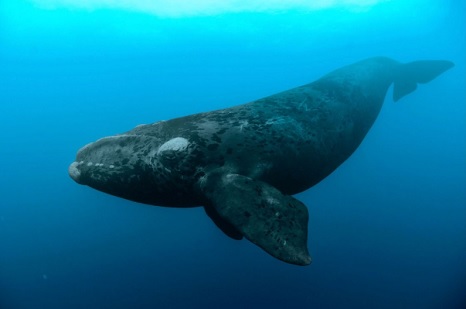
Are right whales big business for nonprofits?
Forget the green economy, the deep blue economy has it beat by a nautical mile. Ever wonder how much money is spent trying to protect the North Atlantic right whale? Ask any of the non-profit corporations that participate in funding to save them. Here in Maine, at least nine non-profit organizations support right whale conservation efforts, in addition to state agencies and the University of Maine. Nationally, the North Atlantic Right Whale Consortium shows 47 environmental organizations it identifies as “partners” on its website. Another 37 environmental groups signed a PEW charitable trust letter to Congress last March, critical of what it believed to be too little funding to protect the species. more, >>click to read<< by Jane Carpenter 08:36
Help Alaska’s fisheries: Reduce methane emissions
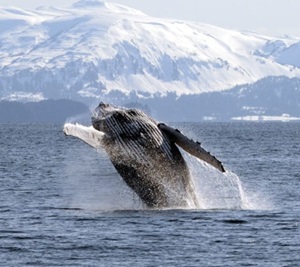 NOAA now confirms that another critical Alaska fishery is in decline due to successive marine heat waves. First there was the loss of 10 billion snow crabs and the close of the once-lucrative Bering Sea crab fisheries; now we know that climate change (warming seas) is the culprit behind the crash of chum salmon on the Yukon-Kuskokwim. Both these fisheries are the life blood to many Alaskan communities and villages. From the Yukon to Kodiak, from the Arctic to Ketchikan, Alaska’s coastal fisheries must now confront the dual threat of heat waves and ocean acidification. more, >>click to read<< By Linda Behnken and Kate Troll 15:48
NOAA now confirms that another critical Alaska fishery is in decline due to successive marine heat waves. First there was the loss of 10 billion snow crabs and the close of the once-lucrative Bering Sea crab fisheries; now we know that climate change (warming seas) is the culprit behind the crash of chum salmon on the Yukon-Kuskokwim. Both these fisheries are the life blood to many Alaskan communities and villages. From the Yukon to Kodiak, from the Arctic to Ketchikan, Alaska’s coastal fisheries must now confront the dual threat of heat waves and ocean acidification. more, >>click to read<< By Linda Behnken and Kate Troll 15:48
Dungennes crab fishery held up again by recent whale and turtle entanglements
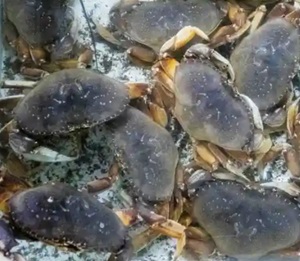 Before the restrictions, the crab fishing season off California started before Thanksgiving, in plenty of time for holiday tables. In recent years, fishermen’s ability to drop their gear has been pushed back because whales and turtles were still be spotted in their fishing zones. This season, fishermen can start dropping their crab pots on Jan. 5, and only in the two most northern California zones. In central and southern California no start date has been announced. Officials with the Pacific Coast Federation of Fishermen’s Associations said the industry does its best to avoid whales and have accepted limiting the seasons, but notes that since the restrictions have been in place, the industry has dropped from 450 active vessels to fewer than 100 and has lost out on tens of millions of dollars. more, >>click to read<< 07:47
Before the restrictions, the crab fishing season off California started before Thanksgiving, in plenty of time for holiday tables. In recent years, fishermen’s ability to drop their gear has been pushed back because whales and turtles were still be spotted in their fishing zones. This season, fishermen can start dropping their crab pots on Jan. 5, and only in the two most northern California zones. In central and southern California no start date has been announced. Officials with the Pacific Coast Federation of Fishermen’s Associations said the industry does its best to avoid whales and have accepted limiting the seasons, but notes that since the restrictions have been in place, the industry has dropped from 450 active vessels to fewer than 100 and has lost out on tens of millions of dollars. more, >>click to read<< 07:47
Following Legal Victory for Maine Lobstermen’s Association, State Receives $17 Million from NOAA to Improve Data on Right Whale
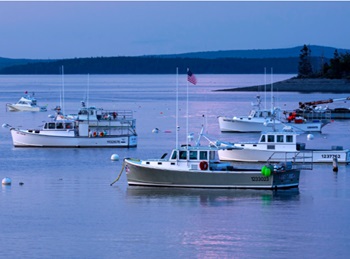 This federal funding comes just months after the federal court of appeals ruled in favor of the Maine Lobstermen’s Association (MLA) in their lawsuit against the National Marine Fisheries Service (NMFS) — a subagency of NOAA — for adopting improperly-founded regulations against the industry. In September of 2021, the MLA filed a lawsuit against the agency alleging that their efforts to protect the NARW were unlawful, as the regulations promulgated were founded upon a “simplistic and false premise” that “exaggerates and arbitrarily inflates the risk posed by the Maine lobster fishery.” The MLA stated that the NOAA’s analyses was “unlawful” as they “did not rely on the best available scientific information, made erroneous and arbitrary assumptions unsupported and contradicted by data and evidence, relied on an outdated and flawed methodology to model projections of the North Atlantic right whale population, and inexplicably failed to account for either the positive impact of mitigation measures already or soon-to-be employed by the Maine lobster fishery.” more, >>click to read<< 07:09
This federal funding comes just months after the federal court of appeals ruled in favor of the Maine Lobstermen’s Association (MLA) in their lawsuit against the National Marine Fisheries Service (NMFS) — a subagency of NOAA — for adopting improperly-founded regulations against the industry. In September of 2021, the MLA filed a lawsuit against the agency alleging that their efforts to protect the NARW were unlawful, as the regulations promulgated were founded upon a “simplistic and false premise” that “exaggerates and arbitrarily inflates the risk posed by the Maine lobster fishery.” The MLA stated that the NOAA’s analyses was “unlawful” as they “did not rely on the best available scientific information, made erroneous and arbitrary assumptions unsupported and contradicted by data and evidence, relied on an outdated and flawed methodology to model projections of the North Atlantic right whale population, and inexplicably failed to account for either the positive impact of mitigation measures already or soon-to-be employed by the Maine lobster fishery.” more, >>click to read<< 07:09
Dungeness Crab Season Delayed Again, SF Crabbers Miss Holiday Haul
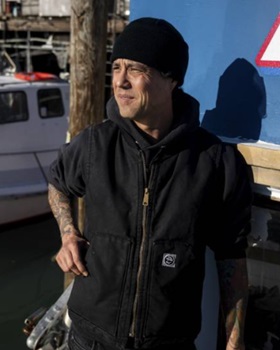 For decades, fishers have earned a living selling Dungeness crab out of San Francisco’s Fisherman’s Wharf. But many, like Shawn Chen Flading, have struggled over the last five years as the state has consecutively delayed the commercial season. “Every delay is difficult. Right now, I have zero income as a fisherman,” Flading said. The season, which has historically started on Nov. 15, is delayed until at least New Year’s Day to protect migrating humpback whales. Crabbers like Flading hope to catch the tail end of the holidays to recoup what they’ve lost. “It’s something people like to splurge on to create a feast,” Flading said. “But with the delay, we’ve lost all the holiday markets.” Photos, more, >>click to read<< 13:37
For decades, fishers have earned a living selling Dungeness crab out of San Francisco’s Fisherman’s Wharf. But many, like Shawn Chen Flading, have struggled over the last five years as the state has consecutively delayed the commercial season. “Every delay is difficult. Right now, I have zero income as a fisherman,” Flading said. The season, which has historically started on Nov. 15, is delayed until at least New Year’s Day to protect migrating humpback whales. Crabbers like Flading hope to catch the tail end of the holidays to recoup what they’ve lost. “It’s something people like to splurge on to create a feast,” Flading said. “But with the delay, we’ve lost all the holiday markets.” Photos, more, >>click to read<< 13:37
Where will the whales be? Ask the climate model
In a new study, scientists say they can now use global temperature models, commonly used in climate science, to predict up to a year in advance when hot ocean temperatures will raise the risk of whale entanglements. This lead time could allow state regulators, fishers and other businesses that depend on the fishery, as well as Californians hoping for a Dungeness crab holiday meal, to plan ahead for potential fishing restrictions. Ecological forecasts could help New England and maritime Canada, where highly endangered right whales are also getting entangled in fishing gear. “My personal opinion is that this is very, very helpful,” said Richard Ogg, a commercial fishing boat captain based in Bodega Bay. more, >>click to read<< 11:57
Seeking Shrimpers to Help Modernize Data Collection
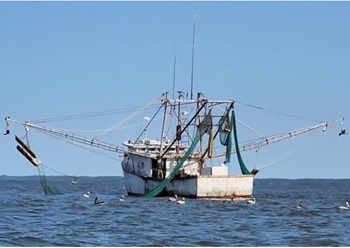 NOAA Fisheries and the Gulf States Marine Fisheries Commission are encouraging the early adoption of a new system to update the data collection process for Gulf of Mexico shrimping effort. The new system will greatly increase the quality and efficiency of data collected to describe the Gulf shrimp commercial fleet and reduce burden on the shrimping industry. The new devices are now available at no cost for a limited number of participants. The program will cover the cost for a limited number of cellular vessel monitoring system units, installation and maintenance, and 2 years of cellular service for the new device. We are seeking volunteers for this early adopter program through September 2024.Support through the early adopter program is available on a first come, first serve basis. more, >>click to read<< 07:53
NOAA Fisheries and the Gulf States Marine Fisheries Commission are encouraging the early adoption of a new system to update the data collection process for Gulf of Mexico shrimping effort. The new system will greatly increase the quality and efficiency of data collected to describe the Gulf shrimp commercial fleet and reduce burden on the shrimping industry. The new devices are now available at no cost for a limited number of participants. The program will cover the cost for a limited number of cellular vessel monitoring system units, installation and maintenance, and 2 years of cellular service for the new device. We are seeking volunteers for this early adopter program through September 2024.Support through the early adopter program is available on a first come, first serve basis. more, >>click to read<< 07:53
Will SAFMC open oculina coral reef to shrimp trawling? Environmentalists oppose plan
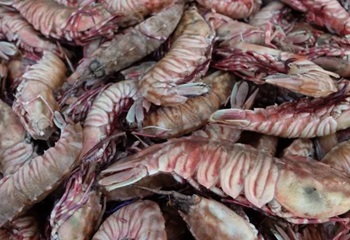 Will an area of ocean bottom offshore of Florida’s Atlantic coast soon be reopened to shrimp fishers? That’s what’s expected to be decided Thursday during a meeting of the South Atlantic Fishery Management Council’s Habitat Protection and Ecosystem Based Management Committee. They will vote on a motion to open a 22-square-mile area of sea floor about 20 miles offshore of St. Lucie, Indian River and Brevard counties. The area is believed to be an area where rock shrimp, and several other varieties of shrimp, can be harvested for sale in Florida seafood markets and restaurants. Commercial fishers say the area, closed to shrimp trawling since 2014, is ripe for productive fishing. Conservationists disagree, saying the area needs to remain closed to protect the slow-growing deepwater oculina coral from fishing practices that could harm the coral. more, >>click to read<< 14:25
Will an area of ocean bottom offshore of Florida’s Atlantic coast soon be reopened to shrimp fishers? That’s what’s expected to be decided Thursday during a meeting of the South Atlantic Fishery Management Council’s Habitat Protection and Ecosystem Based Management Committee. They will vote on a motion to open a 22-square-mile area of sea floor about 20 miles offshore of St. Lucie, Indian River and Brevard counties. The area is believed to be an area where rock shrimp, and several other varieties of shrimp, can be harvested for sale in Florida seafood markets and restaurants. Commercial fishers say the area, closed to shrimp trawling since 2014, is ripe for productive fishing. Conservationists disagree, saying the area needs to remain closed to protect the slow-growing deepwater oculina coral from fishing practices that could harm the coral. more, >>click to read<< 14:25
NOAA Fisheries releases more information about ‘high level’ of killer whales caught this year by Alaska trawl fleet
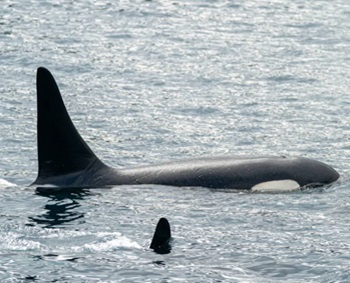 Six killer whales caught in trawl net gear this year in waters off Alaska died as a result of their entanglement, while a seventh whale was seriously injured by this gear, according to a NOAA Fisheries statement released Friday. The trawl fishing industry’s 2023 take of killer whales, first made by public NOAA Fisheries in September, is significantly higher than in recent years past, according to a review of NOAA Fisheries death tolls through 2021. Bering Sea killer whales are not listed under the Endangered Species Act but are protected under the Marine Mammal Protection Act. John Gauvin, fisheries science director for the Alaska Seafood Cooperative, “We want to conduct our fisheries without harming orcas and we’re taking steps to avoid future mortalities,” more, >>click to read<< 10:19
Six killer whales caught in trawl net gear this year in waters off Alaska died as a result of their entanglement, while a seventh whale was seriously injured by this gear, according to a NOAA Fisheries statement released Friday. The trawl fishing industry’s 2023 take of killer whales, first made by public NOAA Fisheries in September, is significantly higher than in recent years past, according to a review of NOAA Fisheries death tolls through 2021. Bering Sea killer whales are not listed under the Endangered Species Act but are protected under the Marine Mammal Protection Act. John Gauvin, fisheries science director for the Alaska Seafood Cooperative, “We want to conduct our fisheries without harming orcas and we’re taking steps to avoid future mortalities,” more, >>click to read<< 10:19
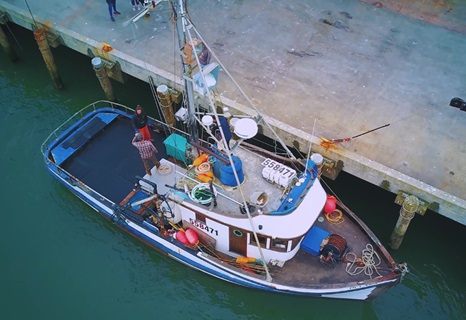
Reopening Areas for Groundfish Fishing After 20 Years
NOAA Fisheries has published regulation changes that will open fishing areas that have been closed for over 20 years. These areas were originally closed in the early 2000s to protect several species of overfished rockfish. With the rebuilt status of almost all these groundfish species, these closures can slowly be opened and allow fishermen greater access to catch healthy fish stocks. The regulations will also close some small areas to protect groundfish habitat, yelloweye rockfish (a species that is still rebuilding), and sensitive areas with abundant coral. These regulation changes are effective on January 1, 2024. Groundfish on the West Coast encompass over 90 species sharing one important trait: at some point in their life, they live on or near the ocean floor. Groundfish are a crucial part of West Coast underwater environments. They act as both predator and prey to different species and help maintain balance in underwater food chains. photos, charts, info, >>click to read<< 11:10
Maine lobstermen signal opposition to participating in ropeless testing program
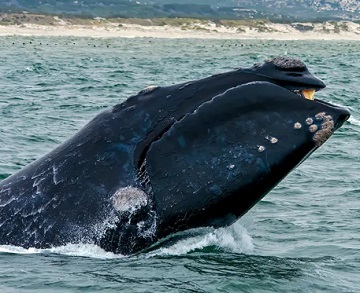 Maine lobstermen are signaling their hesitation to participate in a multimillion-dollar program the state is launching to test new ropeless technology that the federal government soon may require to protect the endangered North Atlantic right whale. Lobstermen have been largely unhappy with the regulations, fearing that the regulations will destroy the lobstering industry as they know it. Maine’s congressional delegation succeeded in securing legislative approval for a reprieve that stalls the regulations from going into effect until Jan. 1, 2029. Industry groups also have succeeded in taking NOAA to court, where the regulations are still tied up. Even so, the clock is ticking and the Department of Marine Resources wants to be prepared for what it expects is an inevitable regulation. more, >>click to read<< 06:31
Maine lobstermen are signaling their hesitation to participate in a multimillion-dollar program the state is launching to test new ropeless technology that the federal government soon may require to protect the endangered North Atlantic right whale. Lobstermen have been largely unhappy with the regulations, fearing that the regulations will destroy the lobstering industry as they know it. Maine’s congressional delegation succeeded in securing legislative approval for a reprieve that stalls the regulations from going into effect until Jan. 1, 2029. Industry groups also have succeeded in taking NOAA to court, where the regulations are still tied up. Even so, the clock is ticking and the Department of Marine Resources wants to be prepared for what it expects is an inevitable regulation. more, >>click to read<< 06:31
Nantucket’s Rich Are Losing the Battle to Keep Wind Power Out of Their Backyards
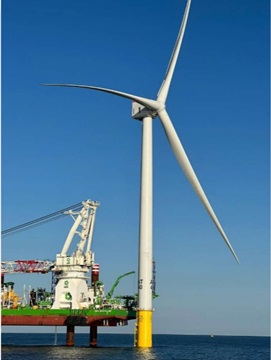 A newly erected wind turbine off the coast of the pristine sandy beaches of Nantucket rises about 850 feet from the ocean surface, higher than any building in Boston, spinning blades about 350 feet long. It’s a marvel of human ingenuity, a shot at a carbon-free future — and the scourge of wealthy denizens of Nantucket and Martha’s Vineyard. A raft of lawsuits from residents and fishing industry groups have complained about everything from obstructed views to marine life hazards and disruptions to whales. But the energy company Avangrid completed the first of 62 giant wind turbines last month, promising enough juice to power more than 400,000 homes and business in Massachusetts. >>click to read<< 10:51
A newly erected wind turbine off the coast of the pristine sandy beaches of Nantucket rises about 850 feet from the ocean surface, higher than any building in Boston, spinning blades about 350 feet long. It’s a marvel of human ingenuity, a shot at a carbon-free future — and the scourge of wealthy denizens of Nantucket and Martha’s Vineyard. A raft of lawsuits from residents and fishing industry groups have complained about everything from obstructed views to marine life hazards and disruptions to whales. But the energy company Avangrid completed the first of 62 giant wind turbines last month, promising enough juice to power more than 400,000 homes and business in Massachusetts. >>click to read<< 10:51
New England lobstermen threaten to sue feds over planned Massachusetts fishing closure
 NOAA is looking to permanently add a wedge between state and federal waters to an existing closure that stretches roughly 9,000 square miles off the Massachusetts coast, a measure feds have put in place to preserve the North Atlantic right whale. An emergency rule prohibited trap and pot fishery buoy lines on the wedge during the past two years, but the feds are looking to make the zone permanent and have the backing of the Massachusetts Division of Marine Fisheries. The proposed permanent expansion to the Massachusetts Restricted Area has caught lobstermen by surprise. Dustin Delano, chief operating officer of the New England Fishermen’s Stewardship Association, took exception to the “recklessness” of the proposal after an amendment was included in this year’s $1.7 trillion federal spending bill that looked to delay protections for the North Atlantic right whale by six years. >>click to read<< 11L27
NOAA is looking to permanently add a wedge between state and federal waters to an existing closure that stretches roughly 9,000 square miles off the Massachusetts coast, a measure feds have put in place to preserve the North Atlantic right whale. An emergency rule prohibited trap and pot fishery buoy lines on the wedge during the past two years, but the feds are looking to make the zone permanent and have the backing of the Massachusetts Division of Marine Fisheries. The proposed permanent expansion to the Massachusetts Restricted Area has caught lobstermen by surprise. Dustin Delano, chief operating officer of the New England Fishermen’s Stewardship Association, took exception to the “recklessness” of the proposal after an amendment was included in this year’s $1.7 trillion federal spending bill that looked to delay protections for the North Atlantic right whale by six years. >>click to read<< 11L27
72 whales have died on the East Coast in a year. NOAA must take action.
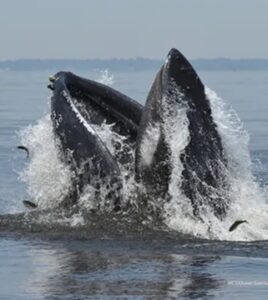 So, what have we learned from the recent whale deaths off the East Coast — 72 since December 2022? They have compelled local communities to question the risks and benefits of offshore wind. Sadly, these same deaths have revealed a disturbing lack of curiosity among the oil-companies-turned-offshore-wind-developers, the National Oceanic and Atmospheric Administration and even some marine scientists who rush to the cameras every time a whale dies to point fingers away from offshore wind development along the eastern seaboard. Proponents of offshore wind are quick to blame global warming (to which of course their solution is offshore wind turbines) moving feeding grounds into shipping lanes and general episodic “vessel strikes” for these deaths. Many hope to close the investigation within the same day or two because the last thing they need is to have two dead whales, less than 30 miles apart, stealing the headlines for a full week. Proponents of these systems are also quick to claim that offshore wind will not harm marine mammals, yet their own action seemingly contradicts that. >>click to read<< 16:49
So, what have we learned from the recent whale deaths off the East Coast — 72 since December 2022? They have compelled local communities to question the risks and benefits of offshore wind. Sadly, these same deaths have revealed a disturbing lack of curiosity among the oil-companies-turned-offshore-wind-developers, the National Oceanic and Atmospheric Administration and even some marine scientists who rush to the cameras every time a whale dies to point fingers away from offshore wind development along the eastern seaboard. Proponents of offshore wind are quick to blame global warming (to which of course their solution is offshore wind turbines) moving feeding grounds into shipping lanes and general episodic “vessel strikes” for these deaths. Many hope to close the investigation within the same day or two because the last thing they need is to have two dead whales, less than 30 miles apart, stealing the headlines for a full week. Proponents of these systems are also quick to claim that offshore wind will not harm marine mammals, yet their own action seemingly contradicts that. >>click to read<< 16:49
Will small boats soon have to slow down off NC to protect North Atlantic Right Whales?
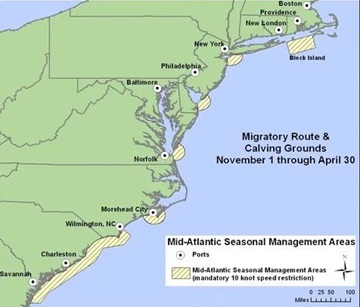 Vessel speed limits to help avoid fatal collisions between ships and one of the most endangered animals in the world that has fallen to around 350 individuals have gone back into effect off the U.S. Southeastern coast, including parts of North Carolina. The seasonal-management areas, or SMAs, limit the speed of most vessels 65 feet or longer to 10 knots, about 11.5 mph, in areas known to have heavy ship traffic that are also migratory routes or known calving grounds for the North Atlantic right whale. The go-slow zones, which run from November through April and have been in effect for more than a decade, extend about 20 nautical miles, or 23 miles, offshore and include areas around Morehead City and Beaufort and within 23 miles from shore between Wilmington and Brunswick, Ga. >>click to read<< 15:46
Vessel speed limits to help avoid fatal collisions between ships and one of the most endangered animals in the world that has fallen to around 350 individuals have gone back into effect off the U.S. Southeastern coast, including parts of North Carolina. The seasonal-management areas, or SMAs, limit the speed of most vessels 65 feet or longer to 10 knots, about 11.5 mph, in areas known to have heavy ship traffic that are also migratory routes or known calving grounds for the North Atlantic right whale. The go-slow zones, which run from November through April and have been in effect for more than a decade, extend about 20 nautical miles, or 23 miles, offshore and include areas around Morehead City and Beaufort and within 23 miles from shore between Wilmington and Brunswick, Ga. >>click to read<< 15:46
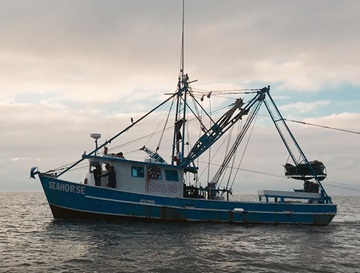
Gulf Coast wins against ‘far-left activists’ in NOAA decision, Alabama officials say
U.S. Sens. Katie Britt and Tommy Tuberville applauded the National Oceanic and Atmospheric Administration rejecting a petition to establish a mandatory 10-knot speed limit and other vessel-related mitigation measures in the Gulf of Mexico.“I was glad to see the NOAA come to their senses and reject this part of the Biden Administration’s overreaching regulatory agenda in the Gulf of Mexico,” said Tuberville (R-Auburn), who has written two letters to administration officials on the issue. “Unfortunately, we still have a long way to go. Designating a Critical Habitat for the Rice’s whale throughout this expansive area would impose undue burdens and restrictions on all vessel traffic, especially in and out of the Port of Mobile.” >>click to read<< 10:09
Delano: Biden administration won’t leave lobstermen alone
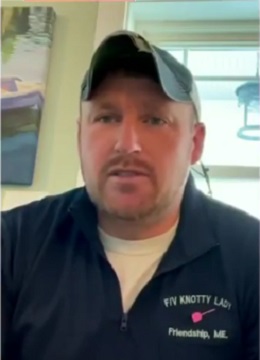 Lawmakers and a federal appeals court last year defeated a federal plan to save endangered whales by eradicating New England’s lobster industry. With those plans undone, the National Oceanic and Atmospheric Administration (NOAA) is crafting a workaround scheme to regulate lobstermen out of the fishery. Recent years have been brutal going for lobstermen, such that the survival of our trade is highly uncertain. Lobstermen are at once negotiating higher fuel costs, higher bait costs, higher shipping costs, and an agitation campaign from dark money nonprofits trained on major buyers of Maine lobster products. NOAA’s new regulatory plan is poised to decimate our inventory. >>click to read<< 09:18
Lawmakers and a federal appeals court last year defeated a federal plan to save endangered whales by eradicating New England’s lobster industry. With those plans undone, the National Oceanic and Atmospheric Administration (NOAA) is crafting a workaround scheme to regulate lobstermen out of the fishery. Recent years have been brutal going for lobstermen, such that the survival of our trade is highly uncertain. Lobstermen are at once negotiating higher fuel costs, higher bait costs, higher shipping costs, and an agitation campaign from dark money nonprofits trained on major buyers of Maine lobster products. NOAA’s new regulatory plan is poised to decimate our inventory. >>click to read<< 09:18






